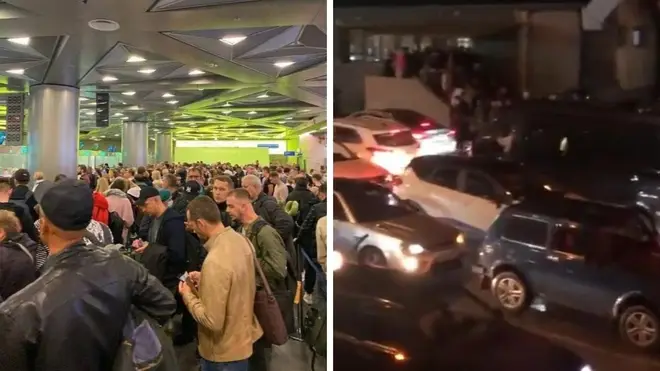
Clive Bull 1am - 4am
22 September 2022, 16:05

Russian men have been fleeing the country in large numbers as they try to avoid being sent to meet their fate as part of Putin's invasion of Ukraine.
There are reports of huge queues at borders as people try to leave Russia after following the military call-up for the war in Ukraine.
Earlier this week Putin announced a ‘partial military mobilisation’, which could see as many as 300,000 people conscripted.
Huge queues formed at the border with Georgia as thousands of people try to escape military service in Putin’s invasion.
Pictures have emerged on social media purporting to show huge queues of people trying to leave Moscow’s international airport, which appear to show large crowds of men of fighting age trying to leave.
Read more: National Insurance rise to be reversed from November 6, Chancellor confirms
Read more: Fracking ban to be lifted in England to 'bolster energy security', govt confirms
Are those crowds Russians wishing to enlist?
— Anton Gerashchenko (@Gerashchenko_en) September 22, 2022
No, these are Russians wishing to flee - these are lines in Vnukovo airport, Russia.
Russians are not ready to take their regime down - they are waiting for Ukrainians to do it. pic.twitter.com/1U20ZrpMuI
Footage also emerged of huge queues of vehicles several cars deep at the border between Russia and Georgia, as tens of thousands of Russians try to flee the country. Other footage apparently shows long queues of people trying to flee into Mongolia.
Anton Gerashchenko, a top adviser to Ukraine’s interior ministry, posted images of the queues of people trying to leave on Twitter, writing: “Are those crowds Russians wishing to enlist? No, these are Russians wishing to flee - these are lines in Vnukovo airport, Russia.
“Russians are not ready to take their regime down - they are waiting for Ukrainians to do it.”
A day after #Putin announced the partial mobilization of reserves for the war in #Ukraine, a long line of vehicles formed this morning near one of the border crossings between #Russia and Mongolia (made up of Russians hoping to flee the country for fear of being... (1/2) pic.twitter.com/YxTLO4mMjS
— AbuAliEnglish (@AbuAliEnglishB1) September 22, 2022
On Wednesday, large numbers of Russians rushed to book one-way tickets out of the country after Putin announced a partial mobilisation of military reservists for the war in Ukraine.
In Latvia, foreign minister Edgars Rinkevics said on Thursday that Latvia will not issue humanitarian or other visas to Russians seeking to avoid mobilisation, citing security reasons.
Meanwhile, Lithuanian defence minister Arvydas Anusauskas said "being drafted into the army is not enough" of a reason for Russians to get asylum in his country, which borders the Russian exclave of Kaliningrad.
"Political asylum is granted to those who are persecuted for their beliefs" or other similar reasons, Mr Anusauskas told the Associated Press.
Russians seeking to avoid being called up to fight are primarily flying to countries that still have direct plane connections, such as Serbia, Turkey, Georgia and Armenia - flights that quickly sold out after Mr Putin's announcement of a partial mobilisation.
The prices of tickets for remaining connections skyrocketed, driven by fears that Russia's borders could soon close or of a broader call-up that might send many Russian men of fighting age to the war's front lines.
Tickets for the Moscow-Belgrade flights operated by Air Serbia, the only European carrier besides Turkish Airlines to maintain flights to Russia despite a European Union flight embargo, have sold out for the next several days.
The price for flights from Moscow to Istanbul or Dubai increased within minutes before jumping again, reaching 9,200 euros (£8,037) for a one-way economy class fare.
Mr Putin's decree stipulates that the amount of people called to active duty will be determined by the defence ministry.
Defence minister Sergei Shoigu said in a televised interview that 300,000 reservists with relevant combat and service experience would initially be mobilised.
Russia has seen a marked exodus of citizens since Mr Putin ordered his troops to invade Ukraine almost seven months ago.
During the early-morning address to the nation in which the president announced the partial mobilisation of reservists, he also issued a veiled nuclear threat to Russia's enemies in the West.
Reports of panic spreading among Russians soon flooded social networks.
Anti-war groups said the limited airplane tickets out of Russia reached enormous prices due to high demand and swiftly became unavailable.
Some postings alleged people had already been turned back from Russia's land border with Georgia and that the website of the state Russian railway company had collapsed because too many people were checking for ways out of the country.
Social networks in Russian also surged with advice on how to avoid the mobilisation or leave the country.
In an apparent attempt to calm the panic, the head of the defence committee of the lower house of Russia's parliament, Andrei Kartapolov, said authorities would not place additional restrictions on reservists leaving the country, according to Russian media reports.
A group based in Serbia - Russians, Belarusians, Ukrainians and Serbs Together Against War - tweeted that there were no available flights to Belgrade from Russia until mid-October. Flights to Turkey, Georgia or Armenia had also sold out, according to the Belgrade-based group.
"All the Russians who wanted to go to war already went," the group said. "No-one else wants to go there!"
Serbia's capital, Belgrade, has become a popular destination for Russians during the war. Up to 50,000 Russians have fled to Serbia since Russia invaded Ukraine and many have opened businesses, especially in the IT sector.
Russians do not need visas to enter Serbia, the only European country which has not joined western sanctions against Russia for its aggression in Ukraine.